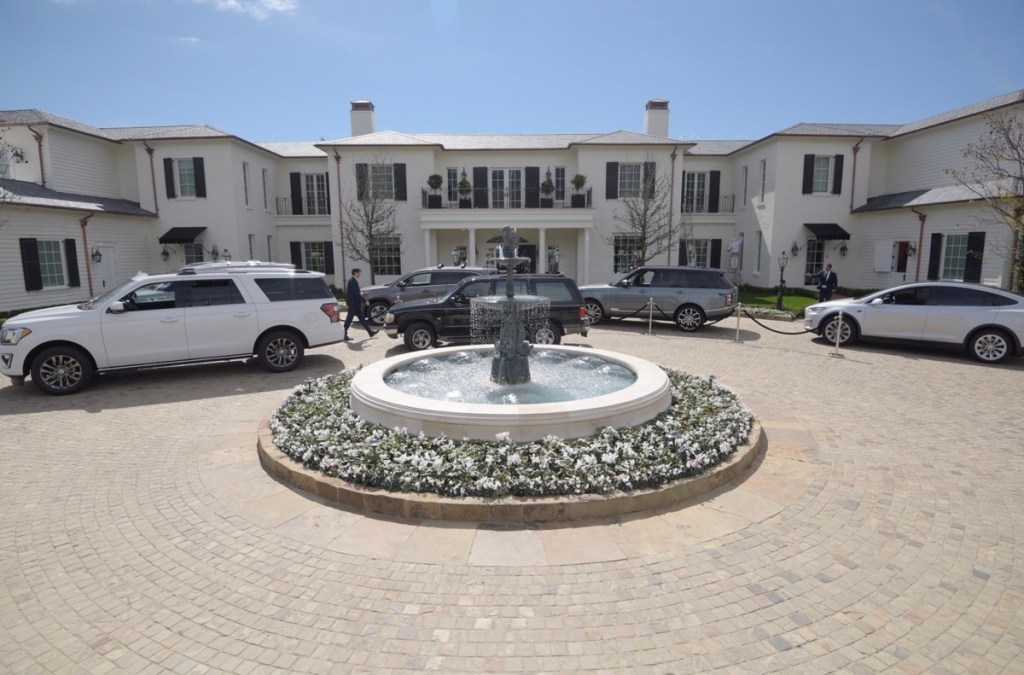Five years after opening, the Rosewood Miramar Beach resort has submitted a plan to replace its western parking lot with new luxury apartments and a collection of retail shops. It is also proposing to construct employee housing on its eastern lot.
The original proposal, presented last October to the Montecito Board of Architectural Review, received significant pushback from boardmembers and neighbors alike, who balked at the western buildings’ three stories and number of boutiques. More than one critic used the term “mini-mall.”
Since then, in response to the board’s feedback and following discussions with neighbors, Miramar executives have scaled back their plan by eliminating the third floor and reducing its retail footprint by as much as 30 percent. They also agreed to remove a driveway from Eucalyptus Lane. Some residents, however, remain concerned about traffic congestion, blocked views, and other impacts to their beachside neighborhood.
As it stands now, the overall plan includes 16 units of employee housing, less than 20,000 square feet of retail space, an undisclosed number of luxury market-rate apartments, and a café. An underground parking garage would be built below the western addition, which would add around 60 new parking spaces to the Miramar’s current total. Utilities would be relocated.
The numbers remain in flux as discussions continue with county regulators and neighbors, said Bryce Ross, a vice president of acquisitions for Miramar owner and Los Angeles shopping center developer Rick Caruso. “We’re talking to anyone who will talk to us,” Ross said during a presentation to the Montecito Association last week. “We’re having coffee, meeting in living rooms.”
Ross told the Association’s Land Use Committee that the architecture and elevation of the new structures would “blend in” with the rest of the property. And he said all operations would be “interior-facing,” with the only access point for the shops along Jameson Lane, down the block from the hotel’s main entrance.
Ross insisted the employee housing ― a mix of studios and one-bedroom apartments ― would target the Miramar’s local workforce, not out-of-town managers, as some have feared. “Just so I can make this as clear as I possibly can,” he said. “That housing is going to be for employees who work at the Miramar and who have the greatest need,” he said. “Meaning the housekeepers, the cooks, the maintenance people. The people who are commuting from Ventura and Carpinteria and Goleta to Montecito because they can’t afford to live here.”
How the rent rates break down among very-low-, low-, and moderate-income units has yet to be determined, Ross said. “We need input from the county on that,” he said. Ross said he hopes as many as possible will qualify as “affordable.” “That’s our mission,” he stated, citing the region’s extreme housing shortage.
When asked if the Miramar would consider scrapping the retail side of the proposal, and instead only build more of the housing it admits the area desperately needs, Ross said the project is only financially feasible if both elements are included. “You can’t have one without the other,” he said about offsetting the high cost of residential construction with retail revenue. “They can’t be decoupled.”
Some neighbors said they’re less worried now that the project has been scaled down. “Many of my concerns have been alleviated and, in some cases, eliminated,” said part-time resident Tom Butler at the meeting. “This is a family-owned business,” he said of Caruso, whose net worth is estimated by Forbes at $5.3 billion. “It’s a rich family, but nonetheless it’s a family.”
Others remain unconvinced. They harbor doubts the employee housing will go to those who truly need it, and they still believe the size and scale of the project is out of step with the area. “I’m terribly dedicated to the semi-rural character of the neighborhood,” said fifth-generation resident Sally Bromfield.
John Agoglia said he represented “about a dozen other neighbors” who shared concerns about “commercialization.” “We’re not opposed to you developing the land,” he said. “We just want to see some guardrails.” Agoglia grew up in Pacific Palisades, he said, “and I saw what happened there. I don’t want that to happen here.”
Caruso opened the Miramar, his first hotel, in 2019 after a lengthy and difficult development process. The 16-acre property along one of Southern California’s most desirable beaches had sat vacant and half-demolished for nearly 20 years after two previous attempts to revive it by two different owners both failed.
Ross told the Montecito Association the project would continue to evolve. It will be back again before the Board of Architectural Review at a later date.

